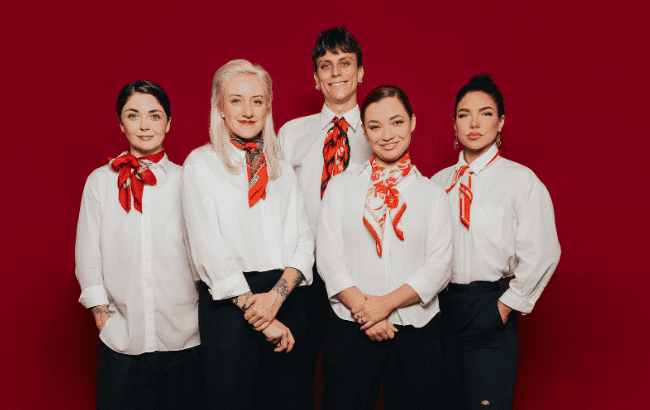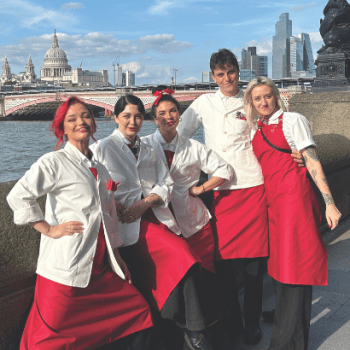Sorry Not Sorry on taking the fight against sexual assault global
By Lauren BowesSydney hospitality collective Sorry Not Sorry was born out of a fight against sexual assault, and is taking its campaign overseas.

*This feature was first published in the August issue of The Spirits Business magazine.
“Often I’m listening to people tell my own story back to me through their own experience,” says Rachel ‘Rocky’ Hair. “It’s almost verbatim. It’s definitely not just Sydney; it’s endemic through the entire industry.”
Hair is the co‐founder of Australian hospitality collective Sorry Not Sorry, and the particular story she is referencing is one that hit headlines – for all the wrong reasons – in August 2024. Hair and fellow co‐founder Jenna Hemsworth went public with allegations of sexual assault and harassment during their time at bar and restaurant group Swillhouse – allegations that had long circulated behind the scenes but had never been made public.
“Jenna and I wanted to keep the conversation going because these things come up in the media and then they get brushed away months later,” Hair says. There was also the very pressing issue of fundraising for their subsequent legal proceedings, which prompted them to host bar takeovers – both to raise money and awareness. “It was crazy, but at that point, we had nothing to lose,” admits Hair.
Blacklisted and banned
Nearly a year later, despite the visibility of their claims and the Sorry Not Sorry campaign, she says little has changed for those who spoke out. “All of those who put our faces to those claims are basically blacklisted from working in hospitality in Sydney,” she says. “I’m even banned from entering a lot of venues in Sydney for speaking up.”
Legal proceedings are still under way, although they are no longer public. In the meantime, the work of Sorry Not Sorry has grown. What began as a scrappy fundraiser is now a global tour – part bar takeover, part panel discussion, part support group. “I think this is a catalyst – or at least we’re trying to be – in starting that conversation and giving people the confidence to say the really hard things out loud,” she explains. “A lot of people come to the panel or takeover and are a little bit apprehensive. Within 10 or 20 minutes, most people crack. A lot of people have shared horrific things, and it’s often the first time they’ve been listened to.”

Sorry Not Sorry has travelled in Australia, Asia and Europe, including a recent stint at London’s Lyaness. While each stop has its own local context, the patterns are grimly familiar. Accountability keeps coming up. “There are these pseudo reporting streams that go nowhere – they just end at making a report,” she says. “Or there’s no way to report safely or without being punished. Across the world, people go to HR and they go to the police. It seems to end with: ‘I said something, and then nothing happened.’”
Discovering the problem is one thing; finding a solution is another. Hair admits she’s unsure what the answer is, but she does have some ideas. “This is draft‐level stuff,” she says, “but I think we’re at a point where we should be utilising technology on a global scale.”
She is conceptualising an external reporting system that could be used across industries to hold perpetrators accountable. She’s not sure what that would look like yet, but she is meeting with data scientists and organisations in Sydney who have worked on similar projects. One Australian example maps anonymous assault reports by location, allowing people to see if there are any hot spots for offences.
In the meantime, Sorry Not Sorry’s work is focused on visibility and solidarity. The takeovers are a crucial part of the formula. “It’s a moment of levity. We want to enjoy hospitality, and we like what we do – we just want it to be a safe space,” she explains. “With the really heavy stuff that goes on, we also just want to have a drink afterwards and have a chat and a dance – really take over those spaces.”
They’re also a model of what safe hospitality can look like.”It’s really easy to be world‐class hospitality professionals without fostering those environments,” she says.
They’ve had backlash, of course. “We’ve had threats. [People] tried to shut down our Sydney event by threatening the staff at the venue who hosted us, and the sponsors,” she says. “But, overwhelmingly, it’s been very positive.”
She’s under no illusions about what they’re up against. “We’re a threat to the status quo – we’re going up against the big guys who have a lot of power and money. They were never going to take it smiling,” she says. “But our message is very simple: don’t assault people. If that’s controversial to you – well, you could just say you’re pro‐assault.”
So, what does a safe bar look like? “As a baseline, treat your staff like humans,” says Hair. “Have a level of basic empathy. Pay them. Realise that although these people are your employees, they are working to live – they are not working for you to live. Understand fundamentally they’re just people who need jobs and the better you treat them, the better they’ll treat your business.”
Change will be a long time coming, but Sorry Not Sorry is hoping to make it little by little. “We can’t action anything immediately,” she says. “But it’s cathartic to be able to sit in a room full of people who have experienced the same thing and say: ‘Oh, yeah, this fucking sucks.’ “We have to all be in this together to make any kind of change. There’s very much power in numbers.”
Related news
Cocktail chat: Foco, Barcelona
